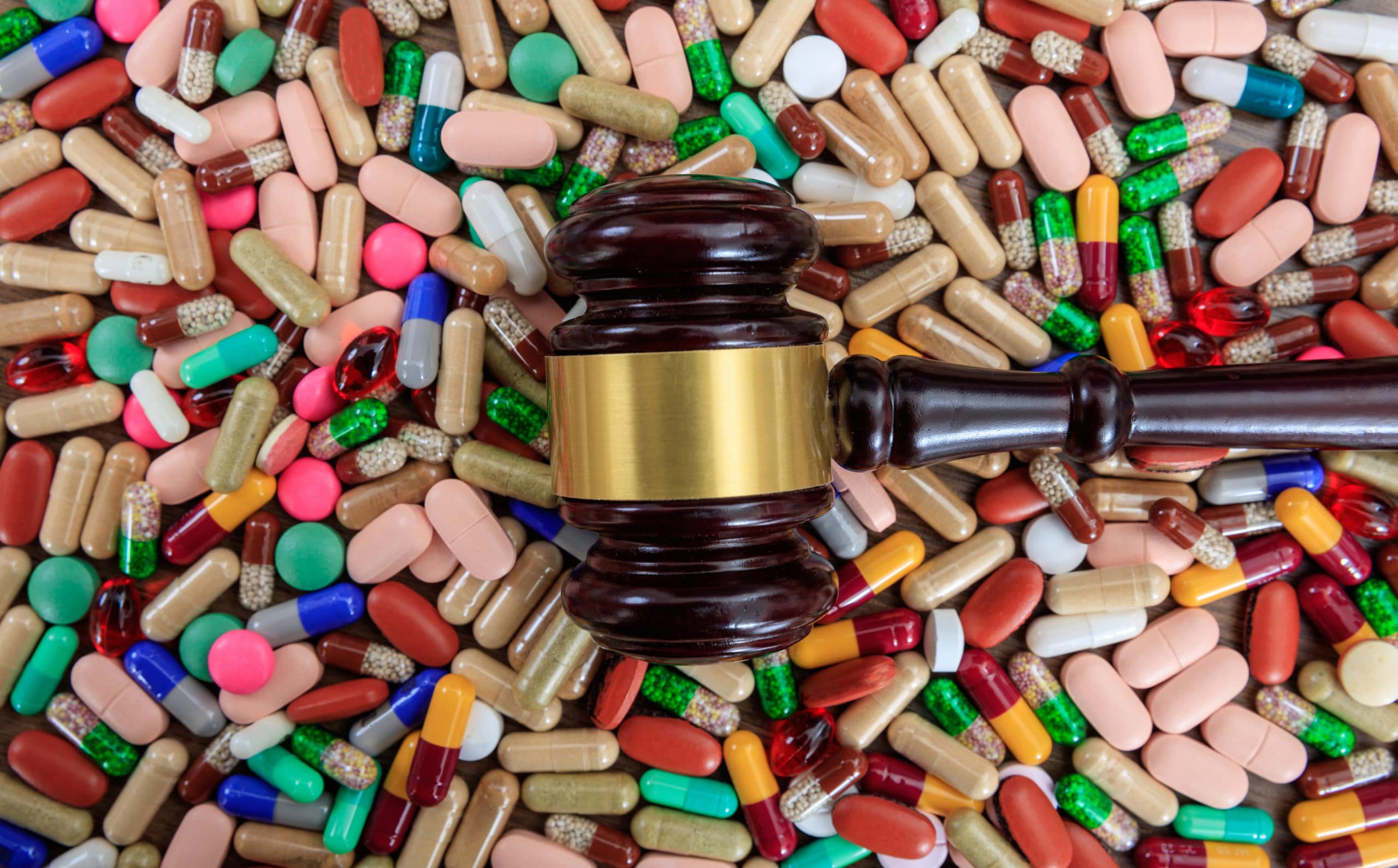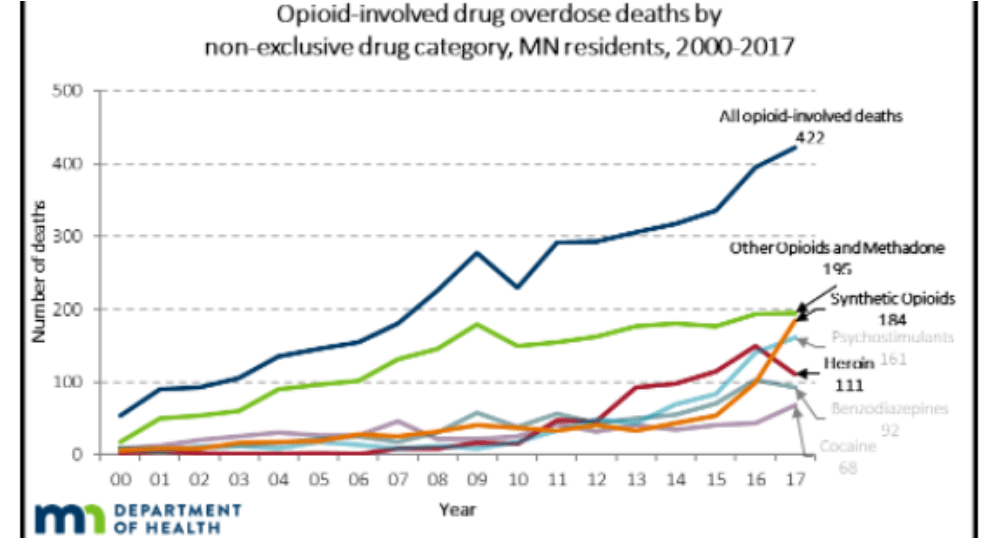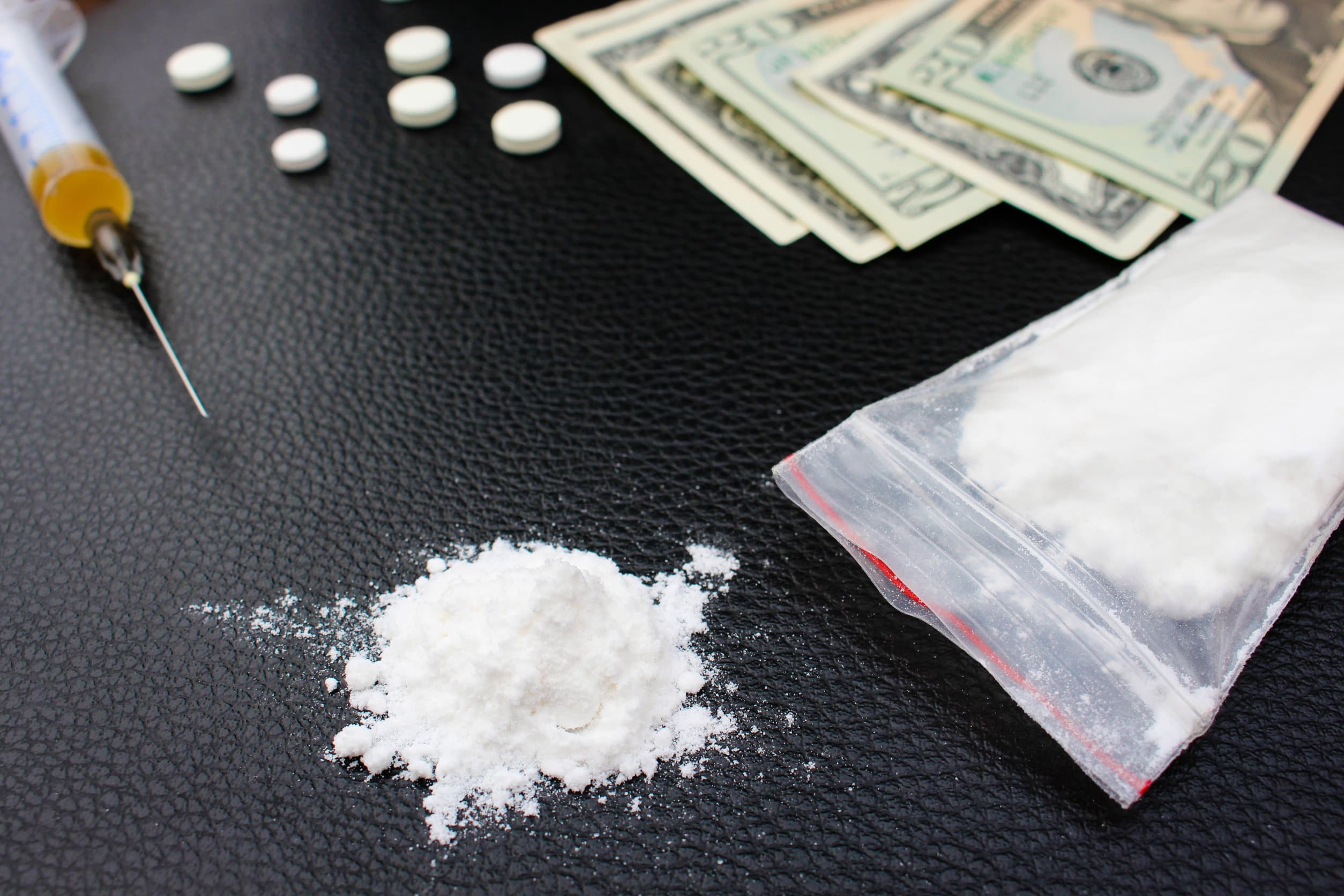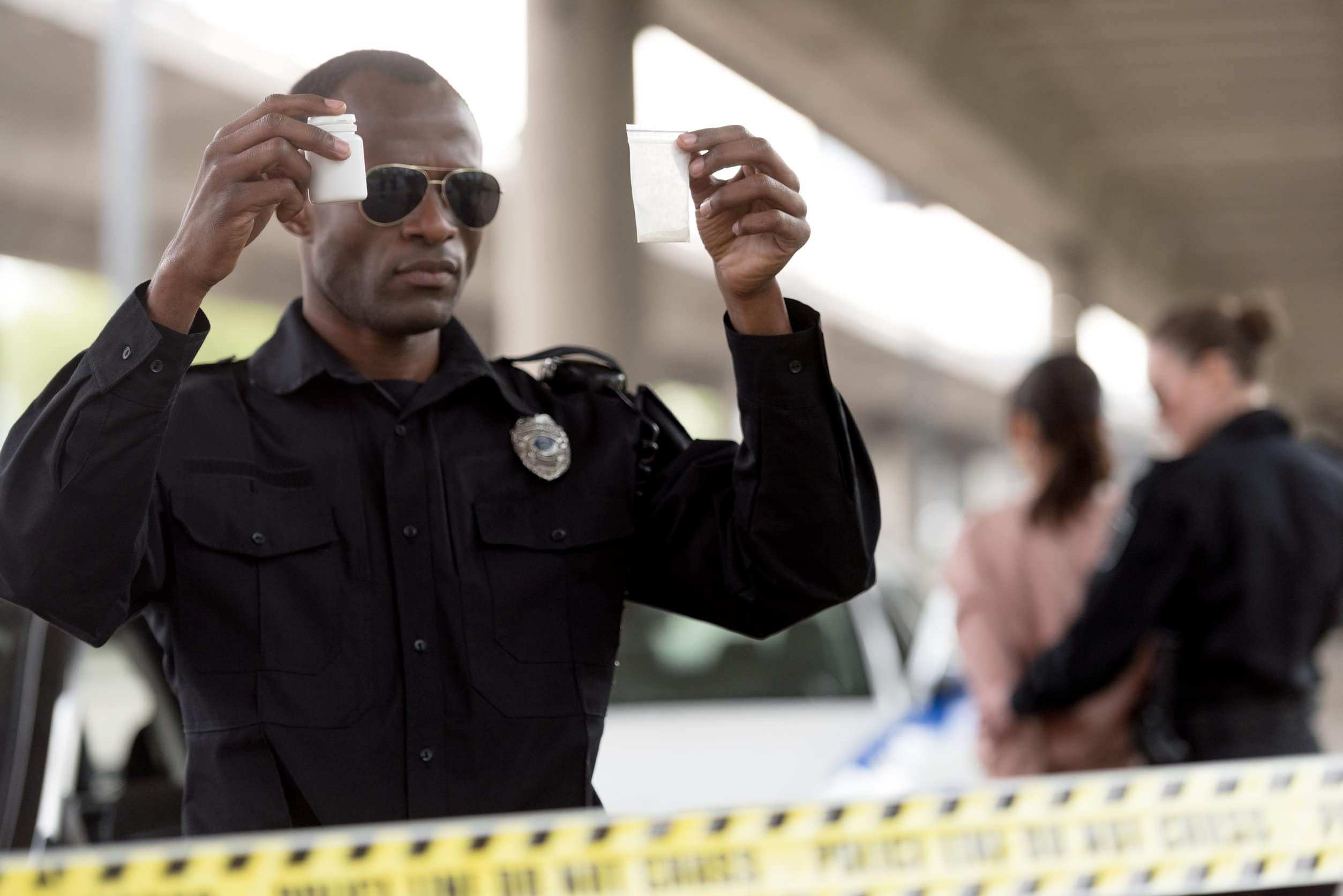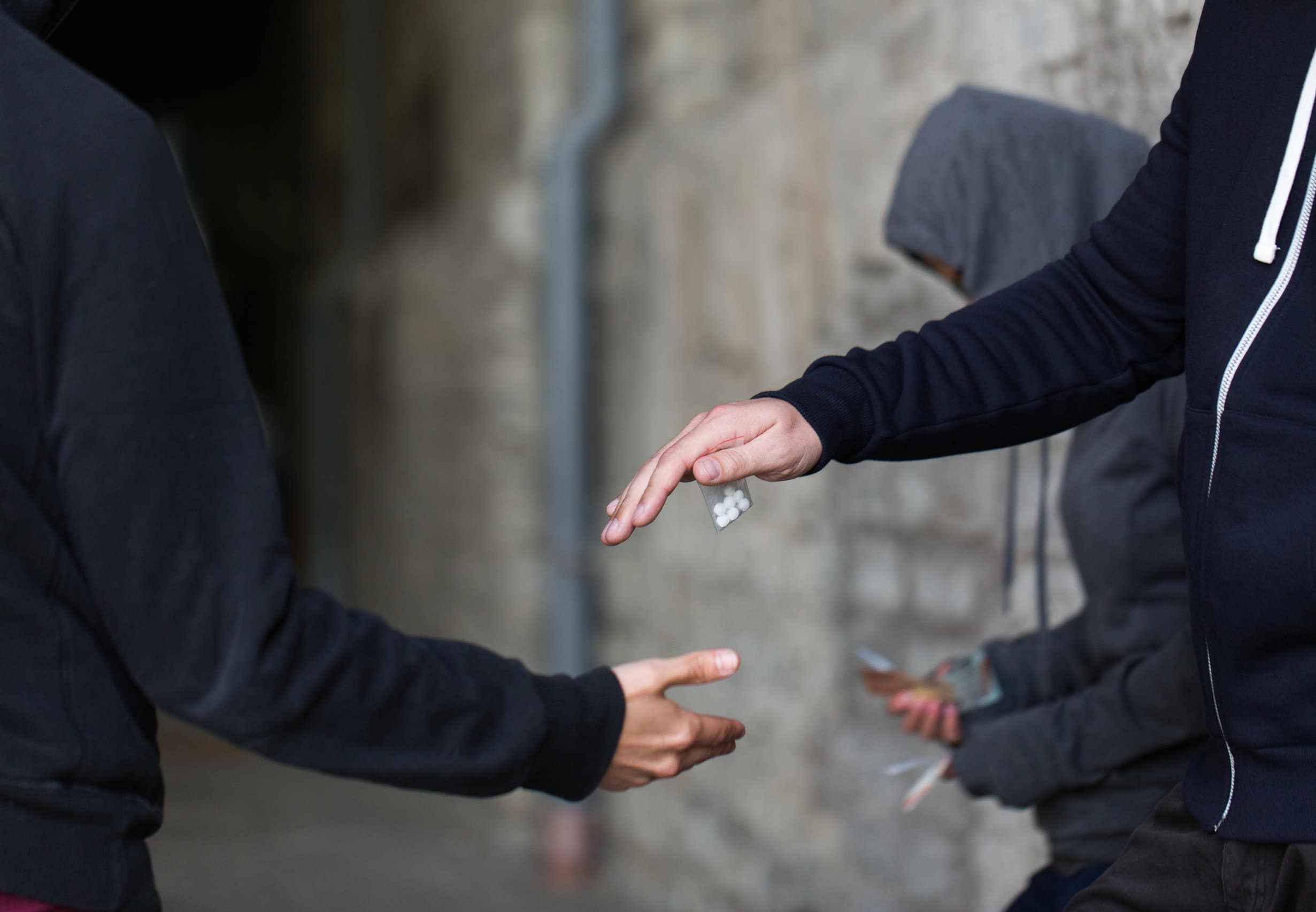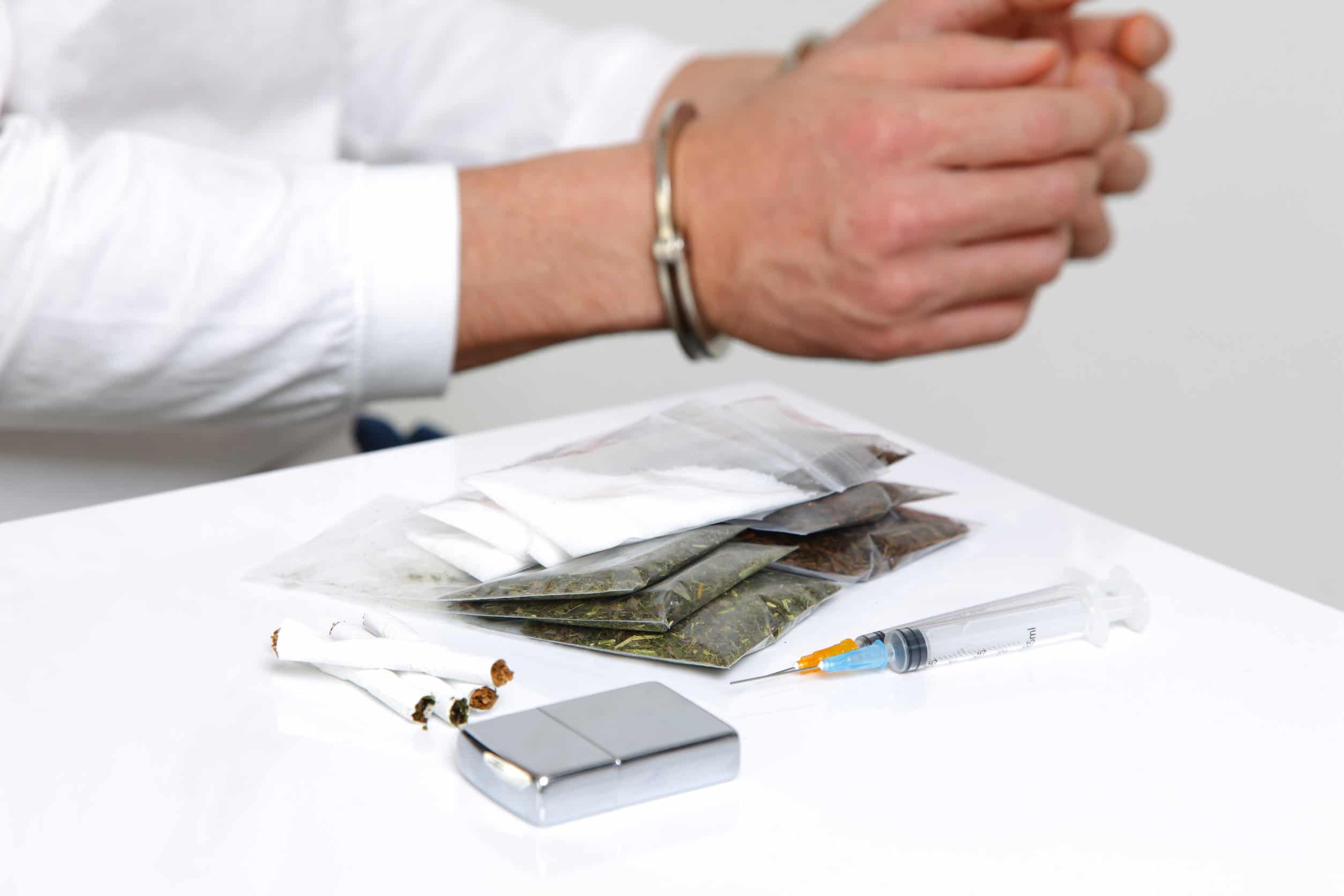When it comes to drug crimes in Minnesota, there’s a lot to understand. The state does enforce strictly controlled substance laws that can have significant consequences on the lives of those who are convicted. That’s why it’s a good idea for everyone in Minnesota to understand not only the laws but what can happen if you are found guilty of a drug crime in the state.
Here is a comprehensive guide to Minnesota drug crimes – including how different substances are treated in the state and how they can relate to the level of crime someone is charged with.
How Serious Is Minnesota’s Drug Problem?
The laws pertaining to drug crimes are not created in a vacuum. Illegal substances cause real problems in our state, and lawmakers are responsible for doing something about them.
Just how bad is it? According to a 2012 SAMHSA survey, the Minneapolis-St. Paul-Bloomington metro area is above the national average for illicit drug use.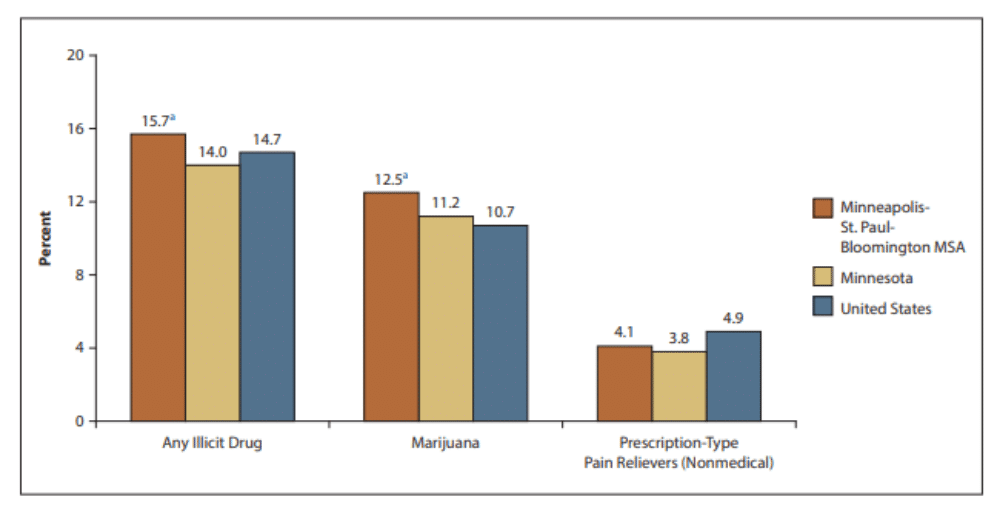
Source: SAMHSA, Center for Behavioral Health Statistics and Quality, National Survey on Drug Use and Health, 2005 and 2006 to 2010 (Revised March 2012).
By itself, this wouldn’t seem to be a big deal, but our state has also dealt with a drastic increase in opioid-related overdoses and deaths in recent years, as well. Just as alarming, this increase holds true for all kinds of opioids.
Source: Minnesota Department of Health.
Marijuana in Minnesota
What adds some complexity to Minnesota drug law is the status of marijuana in the state. Minnesota legalized medical marijuana a few years ago, but the recreational use of the drug remains strictly prohibited by law.
Only businesses approved by the state can sell marijuana, and those businesses are heavily regulated. For those with a medical marijuana card and a qualifying condition that has been certified by a doctor, a 30-day supply of cannabis is permitted under the law. Patients are also allowed to purchase up to two and a half ounces of marijuana flower every 14 days from approved providers.
What Drugs Are Illegal in Minnesota?
The first place to start: Let’s discuss what drugs are actually against the law to possess, sell, and manufacture in the state of Minnesota. Controlled substances are defined as “chemicals or drugs that have their use, manufacture, and possession controlled by the government.” The reason for this designation is that these substances have a high potential for abuse or dependency.
The types of drugs that are illegal to sell and possess in Minnesota include:
- Hallucinogens
- Methamphetamines
- Heroin
- Cocaine
- Marijuana for those without medical approval
- Narcotics such as opiates or prescription medications
There are various levels of drug crimes a person can be charged with in relation to these controlled substances.
What Are the Drug Schedules in Minnesota?
There are five schedules of controlled substances in Minnesota. They range from Schedule I, which is the most serious, to Schedule V, which is the least serious.
The schedule of a drug depends on how addictive the drug is or how high the chances are that it will be abused, coupled with any accepted medical uses for the drug. So, for example, opiates like heroin are Schedule I, because they have no accepted medical use and a high probability of abuse and dependency – while cough syrups with small amounts of codeine are on Schedule V, because they have accepted medical uses without a high risk for abuse.
You can find the drug schedules in more detail here.
Five Degrees of Drug Crimes in Minnesota
The state of Minnesota has broken drug crimes down into five different levels or degrees. The fifth degree is the least serious, while the first degree is the most serious. What degree someone can face depends on a variety of factors, including the type of drug involved, how much of the drug was involved, and where the drugs were found.
The more serious the degree, the more serious the penalties associated with it. Here is a breakdown of each degree and the various crimes often prosecuted under it:
First Degree Drug Crimes
Minnesota first-degree drugs crimes are the most serious under the law. They include several different types of crimes.
First-Degree Sale of a Controlled Substance
You can be charged with this crime if you are caught selling controlled substances in certain quantities to another person, such as:
- Methamphetamine or cocaine – 17 grams or more
- Heroin – 10 grams or more
- Hallucinogens, PCP, Amphetamine – 50 grams or 200 dosage units
- Other narcotics – 50 grams or more
- Marijuana – 55 pounds or more
First-Degree Drug Possession
This is perpetrated when someone is caught with controlled substances in certain quantities:
- Heroin – 25 grams or more
- Methamphetamine or cocaine – 50 grams or more, or 25 grams with two aggravating factors
- Marijuana – 110 pounds or more
- Hallucinogens, amphetamine, PCP – 500 grams or 500 dosage units
- Other narcotics – 500 grams or more
Manufacturing Methamphetamine
The manufacture of methamphetamine is also a first-degree drug crime in any amount.
Second-Degree Drug Crimes
In Minnesota, second-degree drug crimes are also split into separate offenses depending on the minimum amount a person is found with, including:
Second-Degree Sale of a Controlled Substance
- Marijuana – 22 pounds
- Methamphetamine or cocaine – 17 grams or three grams with three aggravating factors
- Schedule I narcotics to a minor in a park, school zone, or public housing
- Amphetamine, hallucinogens, PCP – 50 doses
- Heroin – 3 grams
- Other narcotics – 10 grams
Second-Degree Possession of a Controlled Substance
- Heroin – 6 grams
- Marijuana – 55 pounds or 100 plants
- Methamphetamine or cocaine – 25 grams, or 10 grams with three aggravating factors
- PCP, hallucinogens, or amphetamines – 100 doses
- Other narcotics – 50 grams
Third-Degree Drug Crimes
Third-degree drug crimes are the same as the other levels. Your charge will depend on what you were doing and how much of the substance you had at a minimum level:
Sale of a Controlled Substance in the Third Degree
- Any amount of heroin, cocaine, methamphetamine, or other narcotics
- PCP, amphetamines, hallucinogens – 10 doses
- Marijuana – 11 pounds
- Employing a minor to sell or selling a drug from Schedule I, II, or III to a minor
Possession of Controlled Substances in the Third Degree
Just as with sale crimes, if you are found with these minimum amounts of controlled substances in your possession, then you can face third-degree possession charges:
- Marijuana – 22 pounds
- Heroin – 3 grams
- Other narcotics – 10 grams
- Any amount of a Schedule I, II, or III narcotic
- Hallucinogens – 5 doses if in a park, drug treatment facility, school, or public housing unit
Fourth-Degree Controlled Substance Crimes
For sale crimes, the minimum amounts for charges include:
- Any amount of a substance from Schedule I, II, or III
- Selling any amount of a Schedule IV or V drug to a minor
- Selling any amount of marijuana in a public housing unit, park, drug treatment facility, or school
For fourth-degree possession crimes, the minimum quantity is:
- Hallucinogens or PCP – 10 doses
- Any amount of a drug from Schedule I, II, or III with the intent to sell
Fifth-Degree Controlled Substance Crimes
For controlled substance crimes involving sales in the fifth degree, the minimum amount is:
- Any amount of marijuana
- Any amount of a drug from Schedule IV
For fifth-degree possession, the minimum amounts include:
- Any amount of a substance from Schedule I, II, III, or IV
- The attempt to gain possession of a controlled substance using fraud, a false name, or misrepresentation to a physician
Penalties For Drug Crimes
The penalties for drug crimes can be quite severe in the state, especially for higher-level crimes. The penalties associated with each degree are:
First-Degree Drug Crimes
For first-degree crimes, a person can face up to 30 years in prison and be responsible for fines as high as $1 million. If there is a prior history of drug felonies on a defendant’s criminal record, then there’s a mandatory minimum prison sentence of four years.
For larger quantities of drugs, there may be a 65-month mandatory minimum. Any aggravating factor can also increase penalties.
Second-Degree Drug Crimes
If convicted of second-degree drug crimes, a person can go to prison for as many as 25 years and be ordered to pay as much as $500,000 in fines. Any previous convictions for drug crimes on a criminal record can trigger longer sentencing, including three years as a mandatory minimum sentence.
Third-Degree Drug Crimes
If convicted of a drug crime in the third degree, a person can face up to 20 years in prison and be responsible to pay fines for as much as $250,000.
Fourth-Degree Drug Crimes
The penalty for a conviction of a fourth-degree drug crime includes up to 15 years imprisonment and fines of as much as $100,000.
Fifth-Degree Drug Crimes
The least serious degree of drug crimes still means serious penalties. A person can spend up to five years behind bars for a fifth-degree conviction and be made to pay a fine of $10,000.
Hidden Effects of a Drug Conviction
If you think prison time and fines are all that can happen for a Minnesota drug crime conviction, think again. There are several other consequences that can follow you around once you get out of prison and pay off your fines. Some of these collateral consequences include:
Loss of Firearm Possession
You have a constitutional right to own a firearm, but not if you are found guilty of a felony drug crime. In the state of Minnesota, you will no longer have the right to own a firearm for the rest of your life in the event that you are found guilty of a drug felony. Even for misdemeanors or gross misdemeanors, you can lose the right to own a firearm for up to three years.
Loss of Voting Rights
Voting is a right many people hold dear, but once you are convicted of a felony drug offense in Minnesota, you lose the right not only to vote but also to serve on a jury. However, the loss is only temporary – your rights can be restored after a probationary period has been completed post-conviction.
Deportation for Non-Citizens
If you are an undocumented alien, green card holder, or permanent resident, then being convicted of a drug felony can have consequences for your immigration status. One conviction can be grounds for automatic deportation.
Problems Finding Work
Once you have a drug conviction on your record, it will follow you around for life. Any jobs that perform background checks will see the conviction on your record, and that can impact the kind of work you’re able to find in the future.
Loss of Professional Licensure
Speaking of jobs, if you have a job requiring a professional license such as a nurse, teacher, lawyer, or commercial driver, you can have your license canceled or suspended in the wake of a drug conviction.
Inability to Qualify for Student Loans
You can be ineligible for loans from the federal government for schooling with even a misdemeanor drug crime on your record.
Problems Finding Housing
Just as with job searches, housing searches can become a lot more complicated with a drug felony conviction on your record. Many places that provide housing do a background check, and landlords may turn you down for housing with a criminal record.
Defenses for Drug Crimes in Minnesota
If you are being charged with a drug crime in Minnesota, you need an attorney to help you navigate the process and help you come up with the best defense. While each case is unique, there are some defenses that are used more commonly than others in drug crimes cases, such as:
Illegal Searches
Every person has the right to not be searched and to not have their property seized illegally, under the Fourth Amendment of the Constitution. An officer must have probable cause – or good reason to suspect you’ve committed a crime – in order to legally search your person or property.
If you are searched illegally, then any evidence gathered during that search could be thrown out. The prosecution can lose their ability to use it against you to prove their case. Talk to your attorney if you believe you have been the victim of illegal search and seizure.
The Drugs Were Not Yours
Another common defense is to claim that the drugs you are accused of having were not actually yours. There are a variety of situations in which something like this could reasonably happen, such as borrowing a friend’s car. Talk to your attorney about the circumstances involved in your case to see if this is a plausible defense for you.
There are many ways to defend yourself against drug charges, and an experienced attorney can help guide you. What is of vital importance: Understand the weight of the charges against you so that you can navigate the court system in Minnesota to the best of your ability. Hopefully, you are able to come out on the other side unscathed.
About the Author:
Christopher Keyser is an AV-Preeminent rated criminal and DWI defense attorney based in Minneapolis who is known for fighting aggressively for his clients and utilizing innovative tactics to get the most positive results. He has been featured in numerous media outlets due to the breadth and depth of his knowledge and named a Certified Specialist in Criminal Law by the Minnesota Bar Association. Mr. Keyser is Lead Counsel rated, and he has received recognition for his criminal law work from Avvo, Expertise, Super Lawyers, The National Trial Lawyers, and more.





